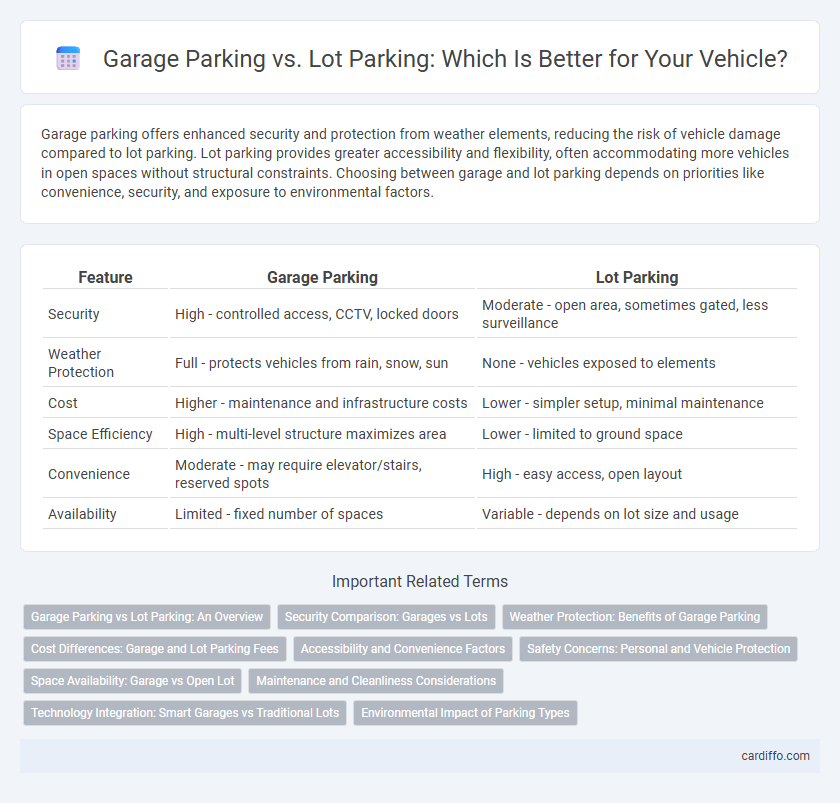Garage parking offers enhanced security and protection from weather elements, reducing the risk of vehicle damage compared to lot parking. Lot parking provides greater accessibility and flexibility, often accommodating more vehicles in open spaces without structural constraints. Choosing between garage and lot parking depends on priorities like convenience, security, and exposure to environmental factors.
Table of Comparison
| Feature | Garage Parking | Lot Parking |
|---|---|---|
| Security | High - controlled access, CCTV, locked doors | Moderate - open area, sometimes gated, less surveillance |
| Weather Protection | Full - protects vehicles from rain, snow, sun | None - vehicles exposed to elements |
| Cost | Higher - maintenance and infrastructure costs | Lower - simpler setup, minimal maintenance |
| Space Efficiency | High - multi-level structure maximizes area | Lower - limited to ground space |
| Convenience | Moderate - may require elevator/stairs, reserved spots | High - easy access, open layout |
| Availability | Limited - fixed number of spaces | Variable - depends on lot size and usage |
Garage Parking vs Lot Parking: An Overview
Garage parking offers enhanced security, protection from weather conditions, and typically better space utilization compared to lot parking. Parking garages often include monitored access and structured levels, reducing the risk of vehicle damage and theft commonly associated with open-air lot parking. Lot parking, while generally more accessible and cost-effective, lacks the comprehensive shelter and security features provided by garage parking facilities.
Security Comparison: Garages vs Lots
Garage parking offers enhanced security through controlled access, surveillance cameras, and protection from weather-related damages, reducing the risk of theft and vandalism. In contrast, lot parking, often open and less monitored, presents higher vulnerability to security threats due to lack of physical barriers and limited lighting. Choosing garage parking significantly decreases exposure to vehicle damage and unauthorized access compared to standard parking lots.
Weather Protection: Benefits of Garage Parking
Garage parking offers superior weather protection by shielding vehicles from rain, snow, hail, and harsh sunlight, which can cause exterior damage and fading over time. This protective environment helps maintain the vehicle's paint quality and reduces the likelihood of rust or corrosion. In contrast, lot parking exposes cars to unpredictable weather conditions, increasing long-term maintenance costs and decreasing vehicle lifespan.
Cost Differences: Garage and Lot Parking Fees
Garage parking typically incurs higher fees than lot parking due to covered spaces and enhanced security features. Lot parking offers lower-cost options with open-air spaces, making it more economical for long-term or budget-conscious users. Monthly garage parking fees can range from $150 to $300, while lot parking averages $50 to $150 per month depending on location and amenities.
Accessibility and Convenience Factors
Garage parking offers enhanced accessibility with sheltered entry points and closer proximity to buildings, reducing exposure to weather conditions and improving convenience for quick access. Lot parking typically provides more space and easier vehicle maneuverability but may involve longer walking distances and exposure to elements, impacting overall accessibility. Choosing between garage and lot parking depends on prioritizing weather protection and security versus space availability and ease of parking.
Safety Concerns: Personal and Vehicle Protection
Garage parking offers enhanced safety with controlled access systems, reducing the risk of theft and vandalism compared to open parking lots. Enclosed structures protect vehicles from environmental hazards such as weather damage and falling debris, which are common concerns in lot parking. Personal safety is also higher in garages due to better lighting and surveillance, minimizing the chance of assaults or accidents.
Space Availability: Garage vs Open Lot
Garage parking typically offers more consistent space availability due to structured layout and reserved spots, reducing time spent searching for a space. Open lot parking provides a larger number of spaces but often experiences fluctuations in availability during peak hours or events. Choosing between garage and lot parking depends on the priority of guaranteed space versus more flexible but less predictable availability.
Maintenance and Cleanliness Considerations
Garage parking offers superior protection from weather-related damage, reducing the need for frequent maintenance compared to lot parking, which is exposed to elements like rain, snow, and debris. Enclosed garages decrease the accumulation of dirt, litter, and leaves, enhancing overall cleanliness and minimizing vehicle cleaning requirements. Lot parking often involves higher maintenance costs for pavement repairs and regular cleaning to manage debris and prevent surface deterioration.
Technology Integration: Smart Garages vs Traditional Lots
Smart garages leverage advanced technologies like automated ticketing, real-time occupancy sensors, and mobile app integration to enhance user convenience and optimize space utilization. Traditional parking lots often rely on manual entry systems and lack dynamic data feedback, resulting in less efficient traffic management and longer search times for available spots. Integration of IoT devices and AI in smart garages facilitates seamless payment processing and improved security features compared to conventional lot parking systems.
Environmental Impact of Parking Types
Garage parking significantly reduces environmental impact by minimizing heat islands and limiting surface runoff through covered structures. In contrast, lot parking contributes to increased urban heat and stormwater pollution due to expansive asphalt surfaces absorbing and radiating heat. Choosing garage parking supports better air quality and reduces energy consumption linked to surface temperature regulation.
Garage parking vs lot parking Infographic

 cardiffo.com
cardiffo.com